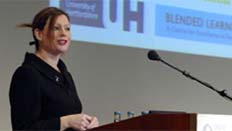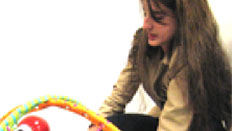Equality, diversity and inclusion in the School of Engineering and Computer Science
Equality and diversity are not only important but integral to the working and learning environment at the University of Hertfordshire.
The School currently holds the Bronze Award: Bronze Award 2019
Meet some of our role models
Martina A Doolan is a Principal Lecturer of Computer Science and a UK National Teaching Fellow receiving the award in 2007 from the minister for Higher Education. Martina graduated from the University of Hertfordshire in 1996 having studied for a BTEC HND in Computer Studies followed by a BSc in Computer Science. In 1997 Martina joined the University as a member of the academic staff.
As a single parent of two young children Martina has progressed her career from lecturer to Senior Lecturer to a Principal Lecturer in just over five years. At the same time, Martina has successfully completed a Postgraduate Certificate, a Postgraduate Diploma, was the first at Herts to achieve the award of MA in Teaching and Learning for her work in Technology Mediated Communication and Collaboration and has been awarded a Doctorate for her thesis in this area.
Martina has gained further recognition obtaining a Vice Chancellors award and as one of 12 chosen academics from across the University working in collaboration on a £4.5 million five year project; leading to the development of e-blended learning solutions across the University of Hertfordshire and beyond.
Martina’s significant national and international presence has been developed and achieved through funded projects, publications, presentations and collaboration, as chair and member of various national and international committees, steering groups, advisory and editorial boards. Martina is an active member of the BCS Women’s group. Martina leads the School of Computer Science Athena Swan Working Group (Self Assessment Team) and is committed to best practice in the working environment for all staff, not just women.
Martina is working towards achieving professor status in her dual professional role as both computer scientist and educationalist .
To learn about Martina’s research interests see her website and Martina's research profile
Scarlet joined the University of Hertfordshire in September 2001. She brought in subject expertise which was much needed for the new programmes of the School. Her experience has grown with her contributions to the School in the areas of learning and teaching innovations in engineering education as well as developing strong networks within the wider higher education community.
Scarlet was awarded a number of learning and teaching grants nationally funded by the Royal Academy of Engineering, JISC and Higher Education Academy. These projects focused on the areas of:
- Capturing Work Experience and Enhancing Employability for Engineering Students
- Re-engineering Assessment for Engineering Education
- Open Educational Resources in Engineering
- Peer Assisted Learning using Advance Web Technologies, etc
In recognition of her achievement in learning and teaching, the Faculty of Engineering and Information Sciences (EIS) appointed her to chair the Faculty Learning and Teaching Commitee in February 2007. With the leadership and management responsibilities of this role, Scarlet led the formulation of the EIS learning and teaching strategy and the faculty learning and teaching action plan. She also chaired the development of the EIS model for employability skills assessment, which was recognised by the University as a leading development among other faculties in supporting academic schools to achieve the University strategic target in student work experience and employability.
With her track record and active contributions in engineering education, Scarlet was awarded a highly commended Vice-Chancellor’s Award for enhancing the quality of the student experience and the success of our graduates in July 2009. Furthermore, her case studies on Re-engineering Assessment for Engineering Education and Capturing Work Experience and Enhancing Employability for Engineering Students were published by the Royal Academy of Engineering and the 1st High Education Academy STEM Conference in April 2012 as pioneering exemplars promoted across the HE sector.
In addition to learning and teaching, Scarlet has also developed her profile of income generation through the short course provision. She successfully organised summer school for overseas partner institutions in the past eight years. Building on the success of the programme, overseas partners have strong willingness and commitment to this short course in the long‐term, which makes this project sustainable.
Scarlet enjoys teaching and continues to demonstrate her motivation and professionalism through her practice.
Lola received a BA and MA in Philosophy from the Complutense University of Madrid, Spain, and a PhD in Computer Science (1995) from the University of Paris-XI, France. She has been a post-doc in the groups of Rodney Brooks at the MIT Artificial Intelligence Laboratory, USA (1995-1996) and of Luc Steels at the VUB Artificial Intelligence Laboratory, Belgium (1997), a senior research fellow at the Artificial Intelligence Institute (IIIA) of the Spanish CSIC (1998-1999) and at the LRI, University of Paris-XI (2000), and invited visiting researcher at ETL in Tsukuba, Japan (1997) and at the LEGO (robotics) Lab of Aarhus University (2000).
Her research revolves around the synthetic modelling of embodied affect (motivation and emotion) in autonomous and social robots and artificial life agents, specialising in the synthetic modelling, in physical robots and artificial life simulations, of affect (motivation and emotion) and its interactions with embodied cognition. She moved from her initial background in philosophy to artificial intelligence (first “classical”, later on “embodied”) and robotics as a way of addressing epistemological problems from a synthetic perspective, taking advantage of the potential that computer science offers. She became involved in interdisciplinary research already as an undergraduate student and interdisciplinarity has marked her career ever since.
She has organised and been involved in the organisation of numerous international conferences and workshops in these areas. She is author or co-author of over 140 refereed scientific papers, co-editor of the books Socially Intelligent Agents: Creating Relationships with Computers and Robots (Kluwer, 2002), and Animating Expressive Characters for Social Interaction (John Benjamins, 2008), guest co-editor of the special issue of Cybernetics and Systems Intl. Journal “Grounding Emotions in Adaptive Systems” (2001), and of the special issue of Intl. Journal of Humanoid Robotics “Achieving Human-Like Qualities in Interactive Virtual and Physical Humanoids” (2006), Editorial Board member of the journals Interaction Studies: Social Behaviour and Communication in Biological and Artificial Systems and Frontiers in Evolutionary Robotics, and co-editor (with C. Pelachaud and T. Kanda) of a new Atlantis Press book series Studies in Humanoid and Social Robotics. She has been a member of the International Society for Research on Emotion (ISRE) since 1999, and is also member of the Association for Computing Machinery (ACM), and of the International Society for Artificial Life (ISAL), and of the EC-funded European Network for the Advancement of Artificial Cognitive Systems, Interaction and Robotics (EUCognition through to EUCog III).
Lola has also been involved in projects funded by the European Commission from very early in her career, starting as a doctoral student in FP4 projects, then as project PI in the FP6 NoE project HUMAINE and FP7 IP project ALIZ-E, and as Coordinator and PI of the FP6 Advanced Robotics STREP project FEELIX GROWING.
Her vision is to ground research into (biological, artificial and synthetic) cognitive systems on a solid interdisciplinary basis, to bring philosophy and cognitive robotics and other computing systems closer together, and to contribute to the development of a community that shares this view.
Dr Mariana Lilley joined the School in 2002.
Mariana teaches on a number of campus-based and online distance learning modules both at undergraduate and postgraduate levels as well as her roles as Student Experience Coordinator and Programme Tutor for the BSc Computer Science Online programme of study. In addition, Mariana supervises PhD students in the fields of Human Computer Interaction and e-assessment.
Her work to enhance the learning experiences of our students has been recognised by the University of Hertfordshire Students’ Union in 2013 and 2014 in the form of two Student Staff Champion awards. Mariana’s work has also been recognised at the Vice-Chancellor's Awards 2013 in the Excellence in Learning and Teaching (Winner) and Tutor of the Year Student choice (Highly Commended) categories.
Last but not least, Mariana is the proud mum Hector.
Removing barriers
In the School of Engineering and Computer Science we want to make sure that as a higher education institution we are able to attract, develop, retain and encourage women to study and work within science, engineering and technology and bring innovation and creativity to industry, the higher education sector and to the University itself.
We acknowledge that some academic areas are affected by female under representation at all levels, which can be exacerbated by schoolgirls' and young women's progress through the education system. We are committed to understanding the issues affecting women in advancing at each level and removing the barriers to their success.
As an Athena SWAN department, we work to raise the profiles of women in science and engineering.
An inclusive culture
The Self-assessment Team have identified and actioned policies and practices to eliminate gender bias in job adverts.
Flexible working processes are actively supported by the School and nominations are made yearly for female staff to undertake the Aurora LFHE programme and local management and leadership programmes.
The inclusive culture means that all staff are encouraged to increase their profiles, conduct research and publish.

News
See a list of Athena SWAN news from the University of Hertfordshire
Athena SWAN
See the University Athena SWAN pages for more about the initiative and news of our Women in STEMM Network.



